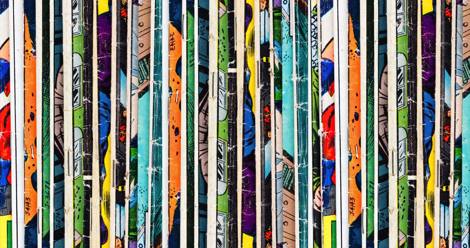
Requiem for a Floppy
About seven years ago, I had a Friday afternoon routine that I loved. I’d leave my office in New York’s Midtown East and walk about a mile to my roommate’s office by the Flatiron Building. We’d stop in at the nearby comic book store (now closed) to collect our pull lists, browse the shelves, and chat with the staff. Then we’d have dinner at Hill Country Chicken, jump on the subway, and head home.
I loved that routine, not least because I’m a creature of habit and because Hill Country Chicken is amazing. And it wasn’t just that my pull list at the time included what remain some of my very favorite comics ever: Bryan Q. Miller and Lee Garbett’s Batgirl, Sterling Gates and Jamal Igle’s Supergirl, Ian Brill and James Silvani’s Darkwing Duck. It was going to the comic book store on a regular basis and getting the latest installment in half a dozen serialized adventures. It was the sense of community from having the owner know my name (well, okay, he called me “Duck Girl,” but honestly, that’s practically my name).
I talk a lot about my frustration with the industry’s determination to yoke itself to an outdated sales model, to anyone who’ll stand still long enough to let me. It chokes promising new series before they have a chance to find an audience. It keeps the Big Two from seeking out emerging and underserved markets. It bears absolutely no relationship to the potential size of the market. And that’s before you get into how much a monthly comic book habit costs, or how inaccessible it is to anyone who has an understocked or hostile local comic store, or no LCS at all.
Trades are the future, and original graphic novels, and web-to-print comics, and digital. The direct market is losing customers to age and expense and bad decision making faster than it’s gaining them. It’s not going to mean an end to Batman or Spider-Man, because the massive corporations that own these characters understand the value of relatively low-cost IP farms they can use to generate massive box office and merchandise sales. But it is almost certainly going to mean an end to monthly print single issues with a staple in them in the not-too-distant future.
And god, I’ll miss them.
You’d think I’d be celebrating, right? And I know on the macro scale it’ll be a good thing for the industry when the bulk of its output shifts to formats that are accessible to anyone with a library card and/or internet access.
But I love monthly floppies. I love collecting them, stacking them, and sorting them. I love the way the new comics of the month look arrayed on a wall with their bright colors and bold logos. I love curling up with a cup of tea and two or three months’ of back issues to pore over on a Sunday afternoon. I love their liminal space as disposable and collectable simultaneously, something that was once rolled up in the back pocket of a kid from the ’40s or polybagged and hoarded by a kid from the ’90s. I love being part of that 80-year tradition.
Most of all, of course, I love reading them. I know many comics fans who prefer trades because they contain a meatier chunk of story, or digital for the ease and simplicity. Heck, I read almost entirely digitally these days because I live in a tiny New York apartment and five longboxes of back issues is plenty.
But I like the way a single issue feels in my hands. I like the serialized consumption of fiction. I like turning a page for a reveal or a stunning double spread, something the experience of digital—or even trades, with their tighter spines—will never quite capture in the same way. I love the storytelling vocabulary that’s developed to fit the format, and I don’t know if it’ll feel the same once it’s severed from context.
I’m not trying to be Old Jess Yells at Cloud about this. It’s been 80 years, and some growing pains are healthy and necessary. Hopefully whatever replaces floppies will allow for the kind of experimentation that allows diverse and inclusive stories to thrive. (We can gripe all day about Marvel’s itchy cancellation trigger finger, but it’s the relatively low overhead of a comic book series that allows those books to exist in the first place; the hurdles for an OGN featuring a licensed character are much steeper.) Whatever happens, storytelling via sequential art will go on—and will continue to be its weird, idiosyncratic, experimental, wonderful self.
But we’ll lose something unique along the way, and that’s worth taking a beat to think about.
Now, if you need me, I’ll be at the comic book shop.











